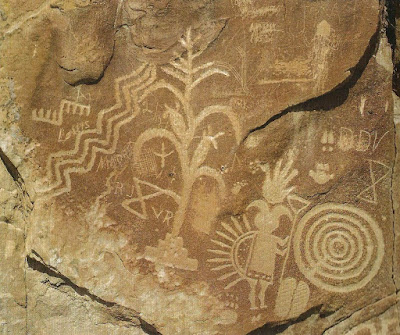Ancient Ruins and Rock Art of the Southwest: An Archaeological Guide, Fourth Edition. David Grant Noble. Taylor Trade Publishing an imprint of Rowman & Littlefield, Lanham, Maryland, 2015. xxi + 296 pp., figures, references, index. ISBN 978-1-58979-937-0 $19.95 (paper), ISBN 978-1-58979-7 $9.99 (eBook).
Saturday, April 23, 2016
BOOK REVIEW: ANCIENT RUINS AND ROCK ART OF THE SOUTHWEST, BY DAVID GRANT NOBLE.
Cover, Ancient Ruins and Rock Art of
the Southwest: An Archaeological
Guide, 4th Edition. David Grant Noble.
NOTE: This book review was previously published in Southwestern Lore: Journal of Colorado
Archaeology, official publication of the Colorado Archaeological Society.
Vol. 81, No. 4, Winter 2015, p. 25.
David Grant Noble.
I recently ran into an old friend again after about 35 years in the fourth edition of David Grant Noble's book Ancient Ruins an Rock Art of the
Southwest. I call it an old friend because the first edition was published in
1980, which was shortly after the time when I became interested in rock art,
and when there were not that many books available with information about rock
art sites. Noble's first edition was a breath of fresh air and a valuable go-to guide, and his fourth
edition is even better.
This is most certainly not a text book, yet it has a wealth
of good information about not only specific sites, but also about the cultures
to which they are attributed. Organized by cultures and cultural regions in the
American Southwest, each entry also concludes with a "suggested
reading" entry pointing the reader to sources of more and deeper
detail. In this sense it makes an
excellent introduction to the cultures of the American Southwest and their
study.
Navajo, Crow Canyon,
Dinetah, p. 250.
It is a sort of a
guide book, but it is much, much more. Some of my favorite facts are that the
tiny settlement of Thompson, Utah, on the way to the great Sego Canyon rock art
site has an old, closed diner that served as a location in the popular 1991
movie Thelma and Louise (p. 17), and
that squabbles over whether or not a road was going to be built that would
impact the Mule Canyon archaeological ruins in Utah served as the inspiration
for Edward Abbey's novel The Monkey
Wrench Gang (p. 110).
Noble moved to New Mexico in 1971, where he was the
photographer on the School for Advanced Research's (SAR) archaeological excavations
at Arroyo Hondo Pueblo, a 14th-century site near Santa Fe. He remained on the
SAR staff until 1989. He has long studied the Southwest's deep history and
archaeology and traveled widely to photograph ruins, rock art, and landscape.
Navajo pueblito, Largo-
Gobernador region, p. 251.
As an accomplished photographer he
has provided most of the beautiful photos that illustrate this volume, and he
has successfully conveyed his love of the subject in both the pictures and the
text.
With detailed information about over 100 sites, and with a
15 page index, this volume is certainly reader friendly. Beginners will find it
a great introduction to the ruins and rock art of the American Southwest. Even
professional archaeologists will find it enjoyable reading for its
comprehensive background and for the human level in which it expresses this
subject. The rest of us will enjoy it as a entertaining read. It is always a
pleasure to run in to an old friend again, and an even more pleasant surprise
to discover how much they have improved with age. Such is the case with Ancient Ruins and Rock Art of the Southwest,
by David Grant Williams, and I look forward to seeing more from him in the
future.
Ancient Ruins and Rock Art of the Southwest: An Archaeological Guide, Fourth Edition. David Grant Noble. Taylor Trade Publishing an imprint of Rowman & Littlefield, Lanham, Maryland, 2015. xxi + 296 pp., figures, references, index. ISBN 978-1-58979-937-0 $19.95 (paper), ISBN 978-1-58979-7 $9.99 (eBook).
Ancient Ruins and Rock Art of the Southwest: An Archaeological Guide, Fourth Edition. David Grant Noble. Taylor Trade Publishing an imprint of Rowman & Littlefield, Lanham, Maryland, 2015. xxi + 296 pp., figures, references, index. ISBN 978-1-58979-937-0 $19.95 (paper), ISBN 978-1-58979-7 $9.99 (eBook).
Subscribe to:
Post Comments (Atom)









No comments:
Post a Comment